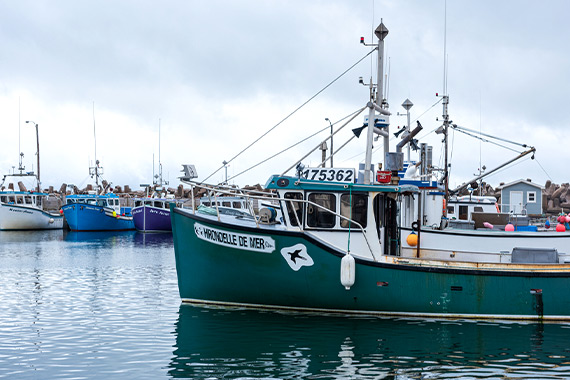
Gaspésie–Îles-de-la-Madeleine intervention strategy
Profile and priorities of a region known for its wind power expertise, biofood and sustainable fishing
Portrait of the region
Territory and populationTwo distinct geographic areas: Îles-de-la-Madeleine archipelago and Gaspé peninsula / population 90,311: 14% on the archipelago / 4% decline in the region's population from 2011 to 2016 / 1.1% of Quebec's total population / 44 rural municipalities across 5 regional county municipalities (RCMs) and one equivalent territory and 3 Indigenous communities (including 1 off reserve) / Low rate of educational attainment and scarcity of qualified labour.
Economy
All RCMs in the region are experiencing slow economic growth / In January 2017, the unemployment rate was at 12%, compared with 6.3% for all of Quebec / The region's 35,200 jobs represent 0.9% of all jobs in the province / In terms of GDP, the region ranks last in Quebec (8.5% of Quebec's GDP).
Assets
World-renowned research centres (Merinov, Wind Energy TechnoCentre) / Exportable expertise for SMEs in the wind energy sector / Award-winning, internationally recognized tourist areas visited by tourists from around the world / Emerging sectors such as ICT and bio-food, which contribute to diversification / Opportunities related to sustainable fishing and vessel fleet renewal.
Challenges
The marked weakness of the manufacturing sector (nearly 130 businesses for the entire region, representing 6% of total jobs) / Jobs are predominantly in the service sector (82%), particularly in government services. Despite the emergence of new sectors, the GÎM region's economy is still based on traditional sectors, such as fishing, tourism and forestry. Region remote from main markets.
Priorities for action
- Businesses supported by CED are innovative and growing
- Priority will be given to SMEs' innovation projects or projects for the adoption of digital technologies.
- Innovative and growing SMEs seeking to break into or expand their reach within global value chains will also receive support, as will their international marketing initiatives.
- Businesses and regions supported by CED participate in an economy geared toward clean growth
- Priority will be given to the start-up and expansion of SMEs that are developing and exporting new processes, products and equipment related to clean technologies and the circular economy.
- Prioritization of a stronger wind energy sector and international market development for businesses with strong potential in this sector.
- Quebec communities benefit from strategic investment that promotes their economic diversification and participation in an inclusive economy
- Priority will be given to projects designed to mobilize drivers of economic development, such as the creation of economic development strategies that tap into regional assets to foster the start-up, expansion and continuity of local or regional job-creating SMEs. Support will also be given to SMEs that contribute to economic diversification and job creation.
- Priority will be given to the development of new attractions as well as projects to renew the region's tourism offering, including accommodations.
- Indigenous peoples benefit from CED programs and participate in Quebec's economic growth
- Priority will be given to projects that contribute to the economic development of Indigenous peoples, particularly those projects that bring added value to the region's major niches (fishing, tourism, agri-food and wind energy). Support will also be given to economic diversification strategies for these communities.